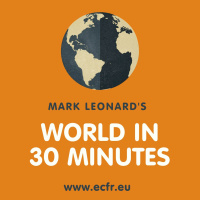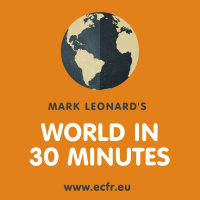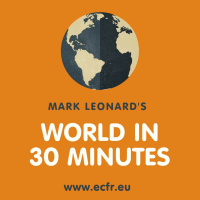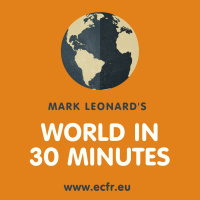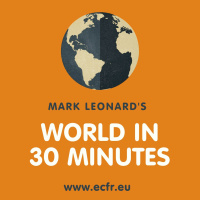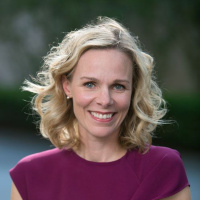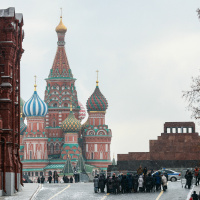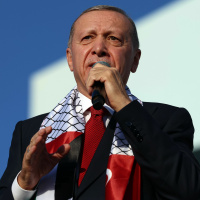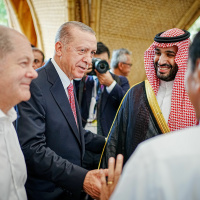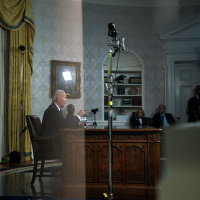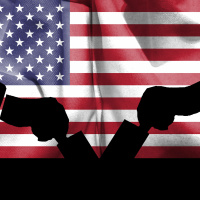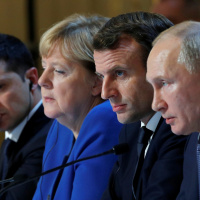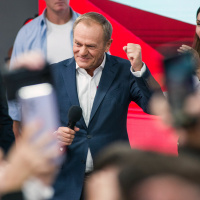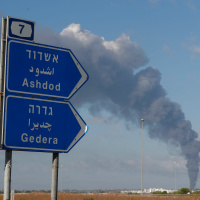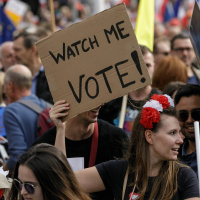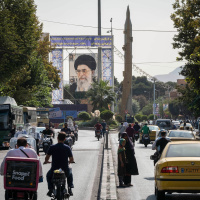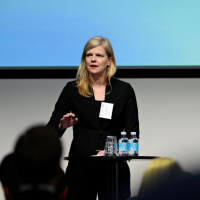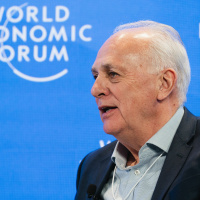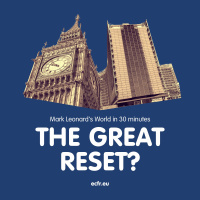Mark Leonard's World In 30 Minutes
- Author: Vários
- Narrator: Vários
- Publisher: Podcast
- Duration: 258:41:47
- More information
Informações:
Synopsis
Foreign policy podcasts hosted by Mark Leonard, Director of the European Council on Foreign Relations (ECFR), the first pan-European think-tank.
Episodes
-
Live from Davos: The 2024 emergency watchlist
19/01/2024 Duration: 31minEvery year, the International Rescue Committee publishes an emergency watchlist, an assessment of the 20 countries at greatest risk of humanitarian emergency. According to the IRC’s report for 2024, the scope of this year’s challenges is broad: Gaza and the West Bank rank only second on the watchlist, behind Sudan. And Ukraine, Syria, Yemen, and Afghanistan don’t even make the top ten. In this week’s podcast, recorded at the World Economic Forum in snowy Davos, Mark Leonard welcomes David Miliband, former British foreign secretary, now president and CEO of the IRC and an ECFR council member, to discuss the organisation’s priorities for 2024. How can Europe address this year’s crises? What will happen if we do not act?This podcast was recorded on 18 January 2024. Bookshelf:Hidden Potential: The Science of Achieving Greater Things | Adam GrantWavewalker: Breaking Free | Suzanne Heywood Hosted on Acast. See acast.com/privacy for more information.
-
Ten foreign policy predictions for 2024
12/01/2024 Duration: 14minChange is inevitable, and so is our beloved predictions episode. As always, Mark Leonard and ECFR’s research director Jeremy Shapiro start the year off by revisiting the ten predictions they made last year and then look into their crystal ball at the forces that will shape the upcoming one. Their predictions for 2023 left them with a score of 7/10. Will they do better this year? Let us know if you think they missed something! You can write your own predictions to mark.leonard@ecfr.eu. This podcast was recorded on 9 January 2024 Hosted on Acast. See acast.com/privacy for more information.
-
Africa and the changing global order
29/12/2023 Duration: 37minThis month, ECFR’s Africa Forum brought together African and European policymakers and thinkers for discussions on the two continents’ strategic partnerships in the changing global order. In this new episode, Jeremy Shapiro welcomes the head of ECFR’s Africa programme, Theo Murphy. They are joined by ECFR visiting fellow, Adebayo Olukoshi, who is a distinguished research professor at the Witts School of Governance in South Africa; and Brian Kagoro, managing director of programmes at the Open Society Foundations. How do Africans view Europe and the EU’s role in the world? What steps can Europeans take to improve their relationships in Africa? Which powers are competing with Europeans for attention in Africa? And what is the EU’s unique selling proposition?This episode was recorded on 12 December, 2023.Bookshelf:Keepers of the Flame: Understanding Amnesty InternationalThe First Black Slave Society: Britain’s “Barbarity Time” in Barbados, 1636-1876 | Hilary McD. Beckles Hosted on Acast. See acast.com/privacy for
-
Understanding the current military situation in Ukraine
22/12/2023 Duration: 37minGoing into the holiday season, the mood among Ukraine’s supporters far from festive. It is difficult to escape a sense that general war fatigue is kicking in, as Europeans bicker over military aid, dysfunction paralyses the US Congress, and the war in Gaza continues to hog the world’s attention. What is more, the frontiers of the Ukraine war have barely budged since last year.In this week’s episode, Jeremy Shapiro welcomes Michael Kofman, senior fellow at Carnegie Endowment’s Russia and Eurasia programme, and Gustav Gressel, senior policy fellow at ECFR. What is the current state of the war? Whatever happened to Ukraine’s much-heralded counteroffensive? And what steps can the West take to help Ukraine prepare for what 2024 might have in store?This episode was recorded on 4 December, 2023Bookshelf:The Seven Moons of Maali Almeida by Shehan KarunatilakaBefore the West. The Rise and Fall of Eastern World Orders by Ayşe Zarakol Hosted on Acast. See acast.com/privacy for more information.
-
The role of the Persian Gulf in the war in Gaza
15/12/2023 Duration: 32minSecond only to the United States, the Gulf countries have emerged as key players in the Israel-Hamas war. Qatar has been a crucial go-between in negotiating the recent hostage return and seven-day ceasefire, but has also come under fire for its chummy relationship with Hamas. The United Arab Emirates, for its part, has maintained a studious neutrality and appears more keen on preserving economic ties with Israel than getting pulled into the conflict. And as the region’s biggest player, Saudi Arabia could still play a decisive role in bringing Israelis and Palestinians to the negotiating table after the war ends (at least the Biden administration hopes so). What is at stake for the Gulf? And is there a constructive role for the region’s countries to play as Israel continues its fight against Hamas amid mounting international criticism?In this week’s episode, Jeremy Shapiro welcomes ECFR visiting fellow, Cinzia Bianco, and senior policy fellow, Hugh Lovatt to discuss the role of the Persian Gulf in the ongoing
-
Digital empires: The global battle to regulate technology
08/12/2023 Duration: 32min“Digital empires” – the geopolitical entities that wield their influence and control in the digital landscape – shape much of how we interact with the online world. Currently, the United States, China, and the European Union are taking the lead, with their substantial investments in technology, innovation, and digital infrastructure, and their efforts to shape and regulate the digital economy. In this week’s episode, Jeremy Shapiro welcomes Anu Bradford, author and Henry L. Moses professor of law and international organization at Columbia University, to discuss her new book “Digital Empires: The Global Battle to Regulate Technology”. In it, she argues that the global regulatory battle between the US, China, and the EU is intensifying, as they try to rein in powerful tech companies while attempting to expand their influence in the digital world. What role do the companies being regulated have to play? Do they have any agency in this great regulatory game? What about the rest of the world’s digital influence?
-
Views from Moscow
01/12/2023 Duration: 35minThe West perceives Russians as either indifferent or supportive of the war being waged on their doorstep. But a sharp decrease in on-the-ground reporting since February 2022 means that the country has become poorly understood.In this week’s episode, Jeremy Shapiro welcomes senior policy fellow Kadri Liik and Valerie Hopkins, an international correspondent for The New York Times covering the war in Ukraine as well as Russia and the countries of the former Soviet Union. Together, they discuss how Russian society really sees the war in Ukraine. How long will Putin be able to sustain the war effort while keeping public dissent to a minimum? And three months after disposing of Prigozhin, how solid is Putin’s grip on power?Bookshelf:War and Punishment | Mikhail Zygar In Different Years | Anatoly Adamishin Hosted on Acast. See acast.com/privacy for more information.
-
What the war in Gaza means for Turkey
24/11/2023 Duration: 31minSince the war in Gaza, Turkey’s president Recep Tayyip Erdoğan has raised eyebrows among his Western allies for his strident criticism of Israel and refusal to condemn Hamas. Likewise, the atmosphere in Turkey has been heated, with attempts to storm an airbase hosting US troops as well as the Israeli consulate in Istanbul.In this week’s episode, Jeremy Shapiro welcomes senior policy fellow Aslı Aydıntaşbaş, a visiting fellow at the Brookings Institute, and Dimitar Bechev, a nonresident senior fellow at the Atlantic Council and the director of the European Policy Institute in Sofia. Together, they look beyond the heated rhetoric and street politics and discuss what the war means for Turkey’s foreign policy. Where do Israel-Turkey relations stand now? Could Turkey play a role similar to Qatar’s? How are US officials reacting to Turkey’s response?This podcast was recorded on 21 November 2023. Bookshelf: Odessa: Genius and Death in a City of Dreams | Charles KingAmerican Prometheus: The Triumph and Tragedy of J.
-
Living in an à la carte world: What European policymakers should learn from global public opinion
17/11/2023 Duration: 34minECFR’s new global opinion poll reveals that many people outside the West want Europe and the US in their lives for all they have to offer – but that does not translate into full political alignment. In this week’s episode, ECFR’s research director Jeremy Shapiro welcomes council member Timothy Garton Ash, who is a bestselling author and professor of European studies at Oxford University; Ivan Krastev, who is a founding board member of ECFR and chairman of the Centre for Liberal Strategies in Sofia; and ECFR’s director Mark Leonard to discuss how public sentiment can guide Europe in building partnerships for the world of tomorrow. What is the basis for the West’s soft power? What sort of offer is China making the world? And whom do countries in the ‘global south’ prefer when faced with a choice between the West and China?This podcast was recorded on 7 November 2023.Bookshelf:Places of Mind: A Life of Edward Said | Timothy BrennanEnvironmental Political Theory | Steve VanderheidenLes Aveuglés, comment Berlin et
-
The consequences of the war in Gaza for Ukraine
10/11/2023 Duration: 33minFor Kyiv, the war in Gaza couldn’t have come at a worse time. It has taken the global spotlight just as the fighting between Russian and Ukrainian forces has reached a stalemate (as top Ukrainian general Valery Zaluzhny wrote in The Economist last week) and division in the US Congress threatens to sever its military aid lifeline.In this week’s episode, Jeremy Shapiro, ECFR’s research director, seizing control from Mark Leonard over the next few weeks, welcomes Gustav Gressel, senior policy fellow with the Wider Europe Programme focusing on Russia, and Kirill Shamiev, visiting fellow and expert in Russia’s civil-military relations, domestic politics, and policymaking.Together, they discuss the consequences of the war in Gaza for the war effort in Ukraine. How has the Ukrainian government responded to this new crisis? What consequences will it have for the Ukraine war? And what can Europe do to manage an ever-growing list of crises in its neighbourhood?This podcast was recorded on 6 November 2023. Hosted on Aca
-
What Europe can expect from the next US president
03/11/2023 Duration: 32minOn 5 November 2024, America will elect its next president. As of now, the race for the White House is shaping up to be a replay of the 2020 presidential election – with Joe Biden and Donald Trump standing out as the likely candidates for their opposing parties. This time around, however, the United States’ engagement in the Middle East and in Ukraine, coupled with its global competition with China, could play a significant role in defining the outcome of the election. In this week’s episode, Mark Leonard welcomes ECFR’s research director Jeremy Shapiro, who is also the director of ECFR’s brand new US programme, and senior policy fellow Majda Ruge, who has worked extensively on US politics. Together, they discuss what America’s foreign policy could look like after the 2024 election and how Europe could engage proactively with the next US president. What should we expect from a second Biden presidency? Or from a second Trump presidency? What should Europeans do to plan ahead? And how can ECFR’s new US programm
-
The blindsided: How France and Germany cleared the way for Russia
27/10/2023 Duration: 34minOn 24 February 2022, Russia blindsided most of Europe with its all-out invasion of Ukraine. This forced an overdue reckoning for Europeans on the failures of their Russia policy and the realities of Vladimir Putin’s agenda. In particular, France and Germany had been hoodwinked by promises of cheap Russian energy supplies, as well as the pipe dream of a common European security architecture with Moscow. In this week’s episode, Mark Leonard welcomes ECFR board and council member, Sylvie Kauffmann, who is editorial director, lead writer, and columnist at Le Monde; and ECFR council member, Timothy Garton Ash, who is a bestselling author and professor of European studies at Oxford University, to discuss Kauffmann’s new book “Les Aveuglés, comment Berlin et Paris ont laissé la voie libre à la Russie” (“The Blindsided: How Berlin and Paris Cleared the Way for Russia”). How and when could France and Germany have acted differently and changed the path of history? At what point was it clear that Putin was heading down
-
How the Polish elections will change Europe
20/10/2023 Duration: 34minPoland is returning to European politics as a constructive player. The country’s National Electoral Commission confirmed on Tuesday morning that the Polish opposition has gathered enough votes to form a government and end the Law and Justice party’s eight-year rule of illiberalism and Eurosceptism. The results also hold two key lessons for Europe: a country’s illiberal turn can be reversed, and polarisation is an insufficient tool to mobilise progressive voters.In this week’s episode, Mark Leonard welcomes senior policy fellows Piotr Buras, head of ECFR Warsaw, and Jana Puglierin, head of ECFR Berlin, to understand what we can expect from Poland’s new government and what Poland’s return to the EU’s centrist fold means for its neighbours and for Brussels. What options do Law and Justice have in opposition? What immediate consequences will the election results have for how Poland relates to the EU, to Germany, and to Ukraine? What effect will they have on the enlargement debate and on European elections next ye
-
Podcast special: Hamas’s surprise attack on Israel
10/10/2023 Duration: 42minOn Saturday morning, Hamas carried out an unprecedented attack on Israel, firing thousands of rockets, but also infiltrating cities, towns, and kibbutzim in the south of the country. It is the first time a hostile power has taken Israeli territory since the Yom Kippur war in 1973. This surprise offensive – which has already killed more than 800 Israelis and left over 400 Palestinians dead in Gaza after initial Israeli military reprisals – marks a significant turning point in the Israeli-Palestinian conflict.In this special episode, Mark Leonard welcomes Israeli diplomat and strategist, Eran Etzion, who is a former head of policy planning at Israel’s Ministry of Foreign Affairs and former deputy head of the country’s National Security Council. They are joined by Julien Barnes-Dacey, director of ECFR’s Middle East and North Africa programme, and ECFR senior policy fellow Hugh Lovatt to discuss what is behind Israel’s intelligence failure and consider possible future scenarios. How did Hamas militants manage to
-
Spain and Poland at the ballot box: what’s next for Europe?
06/10/2023 Duration: 29minLast week, Alberto Núñez Feijóo, leader of Spain’s People’s Party, lost his second bid at leading the country’s government. All eyes are now on Pedro Sánchez, acting prime minister and leader of the Spanish Socialist Workers’ Party, as he tries to gather enough support to hold his office for another term.Across the continent, Poland is preparing for the next parliamentary election on 15 October – and the rising far-right party Confederation is set to swing the balance between right-wing incumbents Law and Justice, and the liberal opposition.In this week’s episode, Mark Leonard welcomes senior policy fellows José Ignacio Torreblanca, head of ECFR Madrid, and Piotr Buras, head of ECFR Warsaw, to discuss how Spanish and Polish politics will affect Europe’s political map, the bloc’s support for Ukraine, the growing debate on enlargement, and next summer’s European elections. Are mainstream parties in Poland willing to form a government with Confederation?Whose support will Pedro Sánchez need to form a new governm
-
Understanding the multipolar Middle East with Ellie Geranmayeh and Alistair Burt
29/09/2023 Duration: 35minFor the past few months, the United States has been trying to broker a groundbreaking bilateral deal between Saudi Arabia and Israel. Iran, meanwhile, is forging an ever closer and ever more dangerous partnership with Russia. Finally, Saudi Arabia, the United Arab Emirates, and Egypt were invited to join the BRICS this summer – and are turning more and more towards the east. In short, the Middle Eastern order has shifted towards multipolarity. In this week’s episode, Mark Leonard welcomes Ellie Geranmayeh, senior policy fellow and deputy director of ECFR’s Middle East and North Africa programme, and Alistair Burt, pro-chancellor of Lancaster University and former UK minister of state for the Middle East and North Africa. Together, they discuss the power dynamics that are shaping the Middle East’s embrace of multipolarity. Who are the winners and losers in these power shifts? How are China and Russia exploiting them? And what can Europe do to pursue its own interests in a region that has become much more comf
-
The End of Germany's China Illusion
22/09/2023 Duration: 33minIn her state of the union address, European Commission president, Ursula von der Leyen, announced an anti-subsidy investigation into Chinese electric cars. This summer, the German government released its first comprehensive China strategy, noting that “China has changed, and therefore we must change our approach.” These events mark a turning point in EU-China relations.In this week’s episode, Mark Leonard welcomes Janka Oertel, director of ECFR’s Asia programme, to discuss her new book “End of the China illusion: How we must deal with Beijing’s claim to power”, published by Piper Verlag (in German). What threats do today’s China pose to Europe and to Germany? What are the West’s biggest misconceptions about China? And what, really, does China want?This podcast was recorded on 20 September 2023.Bookshelf:Ende der China-Illusion: Wie wir mit Pekings Machtanspruch umgehen müssen | Janka OertelFive Times Faster: Rethinking the Science, Economics, and Diplomacy of Climate Change | Simon SharpeLenin: The Man, the D
-
Defending the open society with Mark Malloch-Brown
15/09/2023 Duration: 39minGlobal freedom has been declining for 17 years. Authoritarian turns are increasing, and current events – such as the rise of populism and Russia’s war on Ukraine – are shaping the future of democracy across the globe. In this week’s episode, Mark Leonard welcomes the president of the Open Society Foundations (OSF), Mark Malloch-Brown – who previously served as UN deputy secretary-general under Kofi Annan – to discuss open societies and OSF’s role in promoting justice, democratic governance, and human rights worldwide. What are OSF’s next steps in the new global reality? How could changes in the organisation’s presence in Europe affect civil society on the continent, especially in places like Poland, Hungary, and Ukraine? And how crucial is 2024, a year of big elections in Europe and the United States, for defending the open society model?This podcast was recorded on 13 September 2023. Bookshelf:Open Society BarometerThe Wide World | Pierre Lemaitre Hosted on Acast. See acast.com/privacy for more information
-
The great reset? How the EU and the UK can rethink their security and defense cooperation
08/09/2023 Duration: 31minWar has returned to the European continent, putting many previous divisions into perspective. This has caused European leaders to think afresh about their politics – and raised the question of the United Kingdom’s role in European foreign policy. Seven years after the Brexit referendum, the EU and the UK have finally resolved some of their differences through the Windsor Framework. The possibility of a reset between the UK and the EU on foreign policy could be on the horizon. In this year’s mini-series, Mark Leonard and Susi Dennison examine what a reimagined EU-UK relationship might look like. In this seventh episode, Mark and Susi welcome ECFR senior policy fellow, Nick Witney, who previously served as the first chief executive of the European Defence Agency, and ECFR distinguished policy fellow, Camille Grand, who is a former NATO assistant secretary general. How have Brexit and then the war in Ukraine affected UK-EU defence cooperation? What potential is there for future collaboration in defence, especia
-
The Great Reset? Challenges and opportunities for EU-UK cooperation
01/09/2023 Duration: 31minWar has returned to the European continent, putting many previous divisions into perspective. This has caused European leaders to think afresh about their politics – and raised the question of the United Kingdom’s role in European foreign policy. Seven years after the Brexit referendum, the EU and the UK have finally resolved some of their differences through the Windsor Framework. The possibility of a reset between the UK and the EU on foreign policy could be on the horizon. In this year’s mini-series, Mark Leonard and Susi Dennison examine what a reimagined EU-UK relationship might look like. In this sixth episode, Mark and Susi welcome former permanent secretary in the UK’s Department for Exiting the European Union, Philip Rycroft, who prior to that held several roles in Westminster and Brussels, including in Leon Brittan’s cabinet. How is post-Brexit Britan approaching trade deals and regulatory alignment with third countries? How has Brexit affected the movement of people and labour across borders? What

